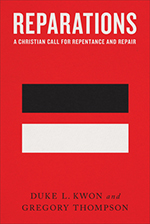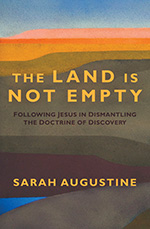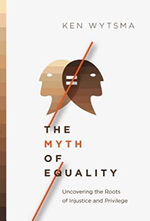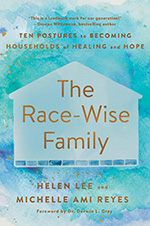
Reviewed by Heather Hedlund
 Reparations. What emotions does that word conjure up for you?
Reparations. What emotions does that word conjure up for you?
Reparations is a word that can easily be a conversation ender or an argument starter. We usually think of it in terms of a large national, political project that seems doomed to never find consensus. This book looks at the idea of reparations from a very different perspective – a Christian perspective. Kwon and Thompson leave the political debate to others and instead ask the question, what is the responsibility of the Christian church in America to respond to the harms caused by centuries of racial injustice in this country.
The authors delve into the root causes of the injustices that have occurred and are still occurring. They help us understand the effects of racism through the lens of the root cause of White supremacy. That's another phrase that can shut a conversation down, but I encourage you to persist through any discomfort you feel and seek to understand how and why they use the term.
Reviewed by: Grace Brown
 Privilege can be misunderstood, but "Subversive Witness" makes clear that privilege must be understood and stewarded faithfully to empower us to bear witness to God's love in new and sacrificial ways. This book left me with an unforgettable impression for two reasons.
Privilege can be misunderstood, but "Subversive Witness" makes clear that privilege must be understood and stewarded faithfully to empower us to bear witness to God's love in new and sacrificial ways. This book left me with an unforgettable impression for two reasons.
First, the author takes Bible stories I thought I knew well—Moses, Zacchaeus, Esther, and others—and completely flips them upside down in ways I still can't believe I've never seen before. Second, this book prompted deep self-reflection of my own privilege. I ended the book feeling restless, seeing places where my own unchecked privilege is now exposed for repentance and new growth.
Reviewed by Pam Hinrichs
 This is a God-honoring, faith-filled, how-to book—how to have conversations about race, how to listen to others (both alike and different from ourselves), how to listen to ourselves, how to listen to God, how to listen to what Scripture has to say to us. The author describes the book as showing us how, to "faithfully combat the racism so many of us say we hate, while mastering the unity so many of us say we want."
This is a God-honoring, faith-filled, how-to book—how to have conversations about race, how to listen to others (both alike and different from ourselves), how to listen to ourselves, how to listen to God, how to listen to what Scripture has to say to us. The author describes the book as showing us how, to "faithfully combat the racism so many of us say we hate, while mastering the unity so many of us say we want."
In the first part of the book, the author presents fictional scenarios and conversations. He follows each scenario with questions for reflection and discussion. The author then counsels the people in the scenarios as a pastor/counselor would. He also makes observations to help us better understand where the people in the scenarios are coming from.
Reviewed by Pam Hinrichs
 A desire for a place to call our own, a home, seems to be a fundamental part of who we are. The systematic, purposeful and comprehensive denial of that opportunity to African Americans, based solely on race, is a travesty and not a well-known or understood part of our recent history. In this book, Rothstein investigates and explains how in the 20th Century, the U.S. government at all levels, Federal, State and local, deliberately instituted racist policies that denied financing and therefore home ownership to African Americans and segregated our cities nationwide.
A desire for a place to call our own, a home, seems to be a fundamental part of who we are. The systematic, purposeful and comprehensive denial of that opportunity to African Americans, based solely on race, is a travesty and not a well-known or understood part of our recent history. In this book, Rothstein investigates and explains how in the 20th Century, the U.S. government at all levels, Federal, State and local, deliberately instituted racist policies that denied financing and therefore home ownership to African Americans and segregated our cities nationwide.
Reviewed by Amanda Geers
 Both a memoir of her fight for justice and a prophetic call to the Church, Sarah Augustine takes us through her story of learning the impact of the Doctrine of Discovery: how it shaped the colonization and taking of land historically, the ways the Church and governments have benefited together from these set of legal decrees, bulls, etc., the long term impact on Native families and individuals, and how even today it is allowing land theft to be perfectly legal particularly in countries in South America, and supports efforts to claim resources from Native owned lands in North America.
Both a memoir of her fight for justice and a prophetic call to the Church, Sarah Augustine takes us through her story of learning the impact of the Doctrine of Discovery: how it shaped the colonization and taking of land historically, the ways the Church and governments have benefited together from these set of legal decrees, bulls, etc., the long term impact on Native families and individuals, and how even today it is allowing land theft to be perfectly legal particularly in countries in South America, and supports efforts to claim resources from Native owned lands in North America.
Can you share a quote from the book that was meaningful to you?
Reviewed by Vicki Foreman
 The vision for BelPres is to help each one of us become disciples, a people committed to becoming more and more like Christ where we live, work, play, and learn. This book has much to say about the simple obedience as disciples of Jesus to both be just and to "do" justice. In Matthew 25, Jesus famously puts it like this: "whatever you did for one of the least of these, you did for me, and whatever you didn't do for one of the least of these, you didn't do for me."
The vision for BelPres is to help each one of us become disciples, a people committed to becoming more and more like Christ where we live, work, play, and learn. This book has much to say about the simple obedience as disciples of Jesus to both be just and to "do" justice. In Matthew 25, Jesus famously puts it like this: "whatever you did for one of the least of these, you did for me, and whatever you didn't do for one of the least of these, you didn't do for me."
The author writes from an evangelical point of view specifically to an evangelical audience. The book has two main points: privilege, and responsibility regarding race. He addresses difficult issues such as "white privilege" from a Biblical perspective, not a political perspective. The reader is invited to consider hard truths from a gospel perspective; truths that may run counter to our cultural beliefs.
Reviewed by Amanda Geers
 This book is great for parents of children of any age as it's never too late to start in creating intentional postures as a family that seek healing, celebration, and hope for all of God's multiethnic, multicultural family. However, I'm grateful to have read this book now while my kids are young, as the authors helped me realize the importance of having intentional conversations around race even at the preschool level.
This book is great for parents of children of any age as it's never too late to start in creating intentional postures as a family that seek healing, celebration, and hope for all of God's multiethnic, multicultural family. However, I'm grateful to have read this book now while my kids are young, as the authors helped me realize the importance of having intentional conversations around race even at the preschool level.
I particularly appreciated the chapter on having a posture of lament as a family. It showed me that the tendency to want to stay only in postures of praise, thankfulness, and celebration may arise from a place of privilege. The authors' suggestions for regularly joining in lament and processing the brokenness and hurt in this world was helpful both on an individual and family level.
Reviewed by: Heather Hedlund
 What is the Doctrine of Discovery? Until a couple of years ago, I had never heard of it. I first learned about it in a TED talk by Mark Charles, and I'll admit his talk was surprising and challenging to me. Unsettling Truths explains the history of the Doctrine of Discovery, how it was used to justify colonization, slavery, and the theft of land from indigenous peoples.
What is the Doctrine of Discovery? Until a couple of years ago, I had never heard of it. I first learned about it in a TED talk by Mark Charles, and I'll admit his talk was surprising and challenging to me. Unsettling Truths explains the history of the Doctrine of Discovery, how it was used to justify colonization, slavery, and the theft of land from indigenous peoples.
The Doctrine of Discovery emerged from a series of papal bulls issued in the 1450's. The pope granted permission to European Christian monarchs to seize land they "discovered" if it was occupied by non-Christians and to submit those occupants to perpetual slavery. The immediate outcome was the institution of the slave trade from Africa by the Portuguese. It eventually led to the occupation and colonization of the Americas, the transatlantic slave trade, and the theft of land from Native Americans.
Page 3 of 4